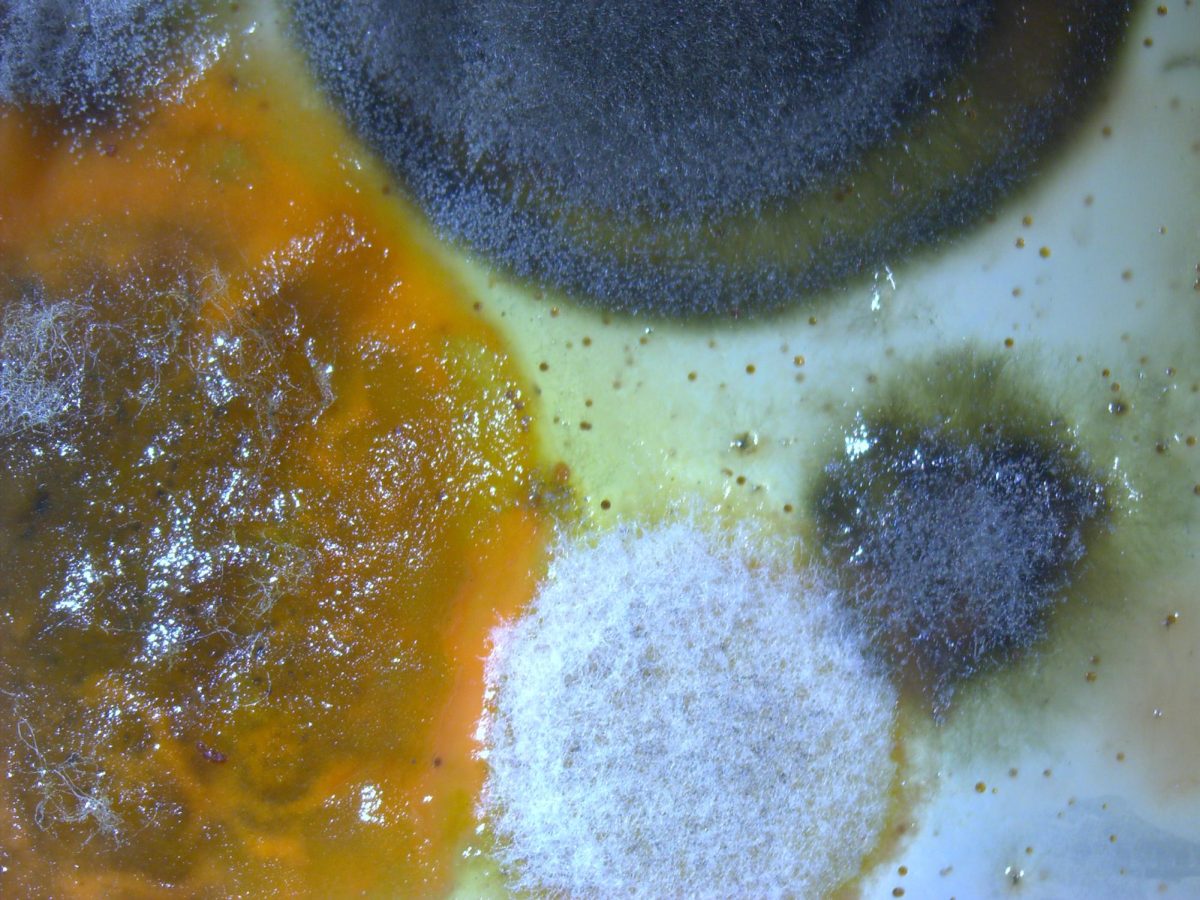Publisher’s Note, October 29, 2024: Professor Aaron B. Steiner assisted in the examination of mold spores found by the authors. Additionally, he is the source for the photograph accompanying this article. Professor Steiner had no say, influence, or role in the investigative or writing process of “Alumni Hall Plagued with Black Mold.”
As college students, health and safety should be priorities. We spend most of our days in our dorm rooms; doing homework, eating meals,
sleeping. But how safe are they really? Reports from students show that an alarming amount of black mold and mildew have been found in dorms across campus. Students wonder what to do about this urgent health concern?
According to The Cleveland Clinic, black mold is a type of fungus that looks dark green or black”. It commonly grows and spreads in warm and damp environments including near windows and showers. It emits an easily recognizable earthy or musty smell, reminiscent of rotting wood or wet leaves. Pace students should lookout for dark-colored spores in or around their showers and HVAC units.
Pace first-year student Kenyon Later recently discovered large amounts of black mold in her Alumni Hall dorm.
Later quickly grew concerned about the health and safety of herself, and her on-campus dog, Bruno. She states that she’s “constantly running an air purifier to prevent getting sick”.
Black mold is unique in that symptoms can lay dormant for weeks or months. Thankfully, Later and her dog have not experienced any symptoms; however, she claims that “if Bruno gets sick, the vet bill could cost thousands of dollars.”
Sydney Anderson is another first-year student who discovered that her suite was infested with black mold. “The previous residents came
to our door to warn us about the mold”, Anderson claims.
The previous occupants allegedly grew very ill due to the mold and were bedridden for weeks. This understandably made Anderson and her roommates panic, not wanting to get sick themselves. Although they got an air purifier, Anderson and her suitemates worry about becoming ill in their own rooms.
So, what do you do if you notice black mold in your dorm? Well, residence hall officials say you should contact maintenance urgently about
the issue. While air purifiers are recommended to reduce the spread of mold, they do not eliminate the problem.
Director of Residential Life, Vincent Birkenmeyer, states that students should “put in a facilities request” if they believe their room has mold. Additionally, “they can also contact residential life who will work with facilities to address if they believe it is an emergency.”
Health Effects Connected to Mold Exposure
Aside from its potent smell and unpleasant aesthetic, long-term mold exposure can seriously affect your health. Exposure comes with both short and long-term health effects targeting the upper respiratory system. Living with mold can increase the risk of developing potentially life-threatening health effects. According to research conducted following natural disasters that left buildings with severe water damage such as Hurricane Katrina, “Building-related illnesses are often linked to dampness promoted growth of fungi and, most notably, Stachybotrys chartarum, a saprophytic ‘black mold’ that grows on cellulosic materials, including wall-board, ceiling tiles, and cardboard.” (Satratoxin G from the Black Mold Stachybotrys chartarum Evokes Olfactory Sensory Neuron Loss and Inflammation in the Murine Nose and Brain.)
Short-term effects of exposure to black mold can appear such as wheezing, coughing, shortness of breath, nasal congestion, sneezing, watery eyes, and asthma attacks. These effects are especially problematic for people who have an allergy to black mold or chronic asthma. Additionally, mold infections such as tinea cruris, onychomycosis, and thrush can occur in extreme cases. (The medical effects of mold exposure- ScienceDirect)
Long-term effects include the development of lung diseases such as asthma. For those with preexisting asthma, an increased rate of morbidity is a pressng risk tied to mold exposure. (Exposure and Health Effects of Fungi on Humans) Mold exposure is also connected to the development of illnesses such as “allergic rhinitis, allergic bronchopulmonary aspergillosis, sinusitis, and hyper-sensitivity pneumonitis” (The
medical effects of mold exposureScienceDirect)
Students are urged to search their rooms for mold and report any mold sightings to maintenance immediately. In order to create the safest possible environment for Pace students, residence life is committed to making sure each dorm room is clean and mold-free.

